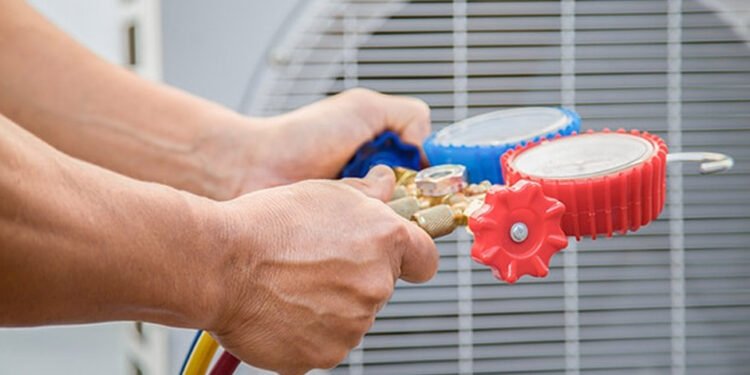When your air conditioning unit starts to struggle with cooling, one of the potential culprits could be a refrigerant leak. The refrigerant in an air conditioner is responsible for absorbing heat and cooling the air circulating within your home. If there is a leak, the system cannot perform its job effectively, leading to warm air being circulated instead of cool air. We will explore how Comfort Doc Heating and Air professionals approach this issue, from identifying the leak to ensuring the system is functioning properly. Understanding the process can help homeowners ensure their units are in good working order, preventing unnecessary breakdowns and maintaining efficient cooling throughout the warmer months.
Diagnosing the Source of a Refrigerant Leak
The first step when dealing with a refrigerant leak is identifying the source. AC repair professionals begin by performing a thorough inspection of the system. Since refrigerant is typically contained within sealed lines and components, any level drop is usually a sign of leakage somewhere in the system. A qualified technician will use specialized tools such as electronic leak detectors or ultraviolet (UV) dye to locate the precise spot of the leak. Electronic leak detectors are particularly effective because they can sense refrigerant gases even in small quantities. In contrast, UV dye, added to the refrigerant, will glow under UV light, making it easier to spot leaks. The process can sometimes be time-consuming, as refrigerant leaks from various places within the system, including coils, connections, and the compressor.
Determining the Severity of the Leak
Once the leak is identified, the technician must assess its severity. Not all leaks are the same—some may be small and gradual, while others could be larger and more immediate. The severity of the leak affects both the repair method and the urgency of the repairs needed. If the leak is large, the refrigerant will drain quickly, causing the system to lose its ability to quickly cool. A technician may perform a pressure test to determine how much refrigerant has escaped and evaluate how much remains in the system. This test involves introducing nitrogen gas into the system and measuring the pressure. If the system fails the test, it confirms that a significant amount of refrigerant has been lost, requiring immediate repairs.
Repairing the Leak in the System
After pinpointing the leak and assessing its size, the next step is repairing it. Depending on the location and nature of the leak, there are different methods to seal the leak. The technician may tighten loose connections, seals, or fittings for minor leaks. In cases where the leak occurs in the coils, a patch or epoxy solution may be applied temporarily. Still, the entire coil often needs to be replaced to ensure the system’s integrity. A full replacement may be required if the leak is found in a part that cannot be easily repaired, such as the compressor or evaporator coil. The technician will ensure that all necessary components are replaced or sealed, then perform a system check to verify that no further leaks are present.
Recharging the System with Refrigerant
Once the leak is repaired, the air conditioning unit must be recharged with refrigerant to restore its proper functionality. During this step, the technician ensures that the system is not overcharged or undercharged with refrigerant, which can affect its performance. The technician will use a scale to measure the correct amount of refrigerant required by the system, as the manufacturer specifies. Adding too much refrigerant can increase pressure in the system, which may cause additional damage, while too little refrigerant will result in poor cooling performance. Proper recharging ensures the unit operates efficiently and can maintain the desired temperature.
Testing the AC System After Repairs
After repairing the leak and recharging the refrigerant, the technician will run a series of tests to confirm the system’s performance. These tests include checking the air flow, cooling output, and refrigerant pressure. The technician will monitor the temperature of the air coming out of the vents to ensure that it is cool enough to provide comfort in your home. They will also inspect the system for unusual noises or vibrations, which could be signs of other issues. A thorough test of the system is essential to ensure that the AC unit is operating as expected and that the repair has successfully resolved the refrigerant leak.
Preventive Measures and Maintenance to Avoid Future Leaks
While repairing a refrigerant leak can restore an air conditioning system to working order, preventing future leaks is always the goal. AC repair professionals will typically advise homeowners on proper maintenance routines that can minimize the chances of refrigerant leaks. Regular maintenance includes cleaning the coils, checking the refrigerant levels, and inspecting the connections. An annual inspection by a technician can help identify potential issues before they become major problems, saving homeowners both time and money in the long run. In addition, replacing aging components or seals that show signs of wear can prevent refrigerant leaks from occurring in the first place. Maintaining your AC unit can improve its efficiency and extend its lifespan.
Refrigerant leaks are a common issue in air conditioning systems, leading to poor cooling performance and higher energy bills. We have explored how professionals handle these leaks, from diagnosing the problem to repairing and recharging the system. The process requires technical skills, specialized tools, and attention to detail. After the leak is repaired and the system is recharged, technicians will perform a series of tests to ensure everything works as it should. Regular maintenance and inspections are crucial to prevent future leaks. By taking proactive steps, homeowners can extend the lifespan of their AC unit and keep it functioning properly for years to come.












